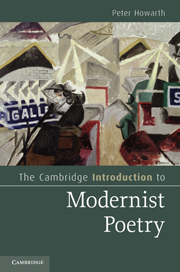Chapter 1 - Why write like this?
Published online by Cambridge University Press: 05 June 2012
Summary
Why write like this?
Imagine yourself, three or four generations younger, walking along Devonshire Street in London on a warm July evening in 1920, and passing Harold Monro's Poetry Bookshop. You were trying to find a shortcut to King's Cross station, perhaps, but you fear you may have gone the wrong way: the street is narrow and rather dirty, with shrieks from small, poor Italian children running a hoop on the pavement. Ahead, an ex-soldier with a missing leg is limping towards you. You realise he is going to ask, shamefacedly, for money, like so many in London now; to avoid refusing him, you turn abruptly into the bookshop itself. Inside, it is quieter, and smells of beeswax from the carved wooden shelves and seats, relics of that brief pre-war fashion for peasant arts in which the shop began, and now looking heavy and a bit tired. On display are various recent publications, including one of the bookshop's in-house anthologies, Georgian Poetry 1918–19. You flip through and your eye is caught by some poems by a Siegfried Sassoon, whose name you vaguely remember in connection with some fuss caused by his letter to The Times a few years back denouncing the war as an exercise in arms profiteering. Well, perhaps he was right, you think, hearing the soldier shuffle past the bookshop window. Sassoon's poems include some brisk little satires in pretty up-to-date language, and you wonder whether to buy them; you are no philistine, after all, and the anthology seems a good-value way to catch up with what's been happening to modern poetry, as well as to atone for not giving to the soldier. As you move to the counter, however, your eye is caught by a small pamphlet covered in what looks like Christmas wrapping paper. You open it. Paris: A Poem by Hope Mirrlees, published by the Hogarth Press not far away in Mecklenburgh Square. But Paris does not appear to be a poem at all. It is more like the page of a notebook; scraps of phrases, a shopping list, memos in some private language, Métro stations:
I want a holophrase
NORD-SUD
ZIG-ZAG
LION NOIR
CACAO BLOOKER
Black-figured vases in Etruscan tombs
RUE DU BAC (DUBONNET)
SOLFERINO (DUBONNET)
CHAMBRE DES DEPUTES
Brekekekek coax coax we are passing under the Seine
DUBONNET
The Scarlet Woman shouting BYRRH and deafening
St John at Patmos.
What kind of poem is it? It doesn't rhyme. It's not in regular metre. It doesn't seem to be a poet speaking noble ideas. It's not telling you about anything, particularly. The ‘St’ has been inserted in ink: evidently the poem's crazy typography baffled Hogarth's own proof-reader, never mind its ordinary readers. It's in two, no three languages, as your grammar-school education dimly recalls the chorus ‘Brekekekek’ from Aristophanes’ ancient comedy, The Frogs. But what are Aristophanes and Etruscan vases doing alongside Blooker's cocoa, or Lion Noir shoe-polish, or French liqueurs, or St John deafened by the Whore of Babylon, who is now reduced to selling another liqueur? It doesn't move you in any way, or lead you to any deeper thought. It all seems rather precious compared to Sassoon. You flip through. There are street signs in capitals; copies of plaques on famous people's houses, some bars of music and one section where the lines are only one letter wide. Jottings about the Virgin Mary, carnivals and spring. It must be some continental art-as-nonsense clique, probably, like those ‘Futurists’ and their music-hall stunts before the war. You pay for your Georgian Poetry and, picking your way past the invalids in Queen Square, come with relief upon Russell Square tube station. As you wait on the platform down below, though, a thought strikes you. Undergrounds. The Paris Métro's Nord--Sud line. Etruscan tombs. The shopping list is the adverts you see in motion as the underground train rattles on. Blackness in the dark, or in ‘Lion Noir’ shoe polish. And the Frogs…didn't they sing their song in the underworld, where Dionysos the god went to bring the poet Euripides back, so he could write new poems and stop Athens from continuing a crazy war? Maybe Paris wasn't all nonsense. But if Hope Mirrlees wanted to write poems to stop wars, she was going about it in an odd way. Why not just say it straight, like Sassoon? Why on earth would anyone want to write like this?
- Type
- Chapter
- Information
- The Cambridge Introduction to Modernist Poetry , pp. 1 - 32Publisher: Cambridge University PressPrint publication year: 2011



